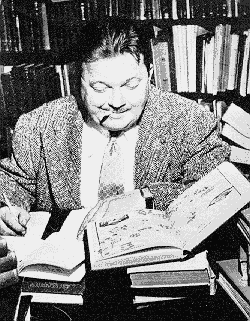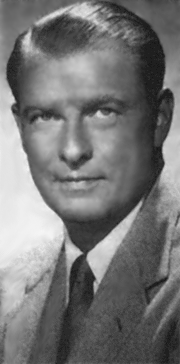Introduction
The characters in tonight's Quiet Please are neither living nor dead. They enjoy neither of these interesting conditions because they're soley the invention of my own imagination. Wyllis Cooper in Clarissa
Quiet Please (sometimes alternately punctuated as "Quiet, Please" or "Quiet, Please!") aired from June 8th, 1947 until June 20th, 1949. It begain on the Mutual Broadcasting System, and moved to ABC in September 1948. It is considered by many to be among the most uniquely creative series in history.

The creative forces behind the series were Wyllis Cooper (creator, writer, director) and Ernest Chappell (featured actor). Cooper was not at all new to radio drama when he began work on Quiet Please. He teamed with John Housman in writing the scripts for the final season of Mercury Theatre on the Air (by then called Campbell Playhouse), and in 1934 created the popular horror series Lights Out. Although significantly different in style, and although Arch Obler took over in 1936, Lights Out had a similar goal. Both series seek to chill the listener through a completely immersing personal experience. The titles and introductory sequences of each series indicate the desired immersion -- the listener is expected to shut off distracting outside stimuli, such as light and sound, in order to fully concentrate on the unfolding story. Lights Out intro Quiet Please intro In both series, the introductions set a slow, dark, and mysterious mood.
Although Chappell had previously been a newsman and announcer, with no significant acting credits, he was perfectly suited to his Quiet Please roles. The series did not feature him in action-oriented roles, but rather as a dramatic storyteller. Chappell introduces a story The credits for most episodes describe Chappell as "the man who spoke to you." The conversational approach is a major way in which the series accomplishes the difficult task of thoroughly immersing the listener into the story. By speaking directly to the radio audience, Chappell gives the listener a role in the unfolding plot. Chappell speaks to radio audience The scripts manage to accomplish the difficult task of incorporating a character into the story without using any dialog, leaving each individual listener to fill in their own lines as they see fit. Although usually the main plot occurs in flashbacks described by Chappell's character, the audience is often involved in the crucial moments. Unusual inquest

Quiet Please is a creative series, but it's consistently creative -- there's continuity in the creativity. A regular listener knew before turning on the radio that the story would have the distinctive style of both Cooper and Chappell imprinted upon it. Every week, Chappell's stream of consciousness narrative would examine a world similar to our own, but not quite real -- one convincingly like our own, but with a touch of the supernatural. Calling All Souls The same indescribable sense of emotion would end each episode, concluding with a few seconds of silence followed by the slow strands of Cesar Franck's Symphony in D Minor. Symphony in D Minor Not the least of the reasons for the consistent quality of the series is that Cooper and Chappell worked well together, having already been close friends before the series began. No doubt Chappell's familiarity with Cooper helped him to better understand the characters he was portraying, while in turn Cooper was able to write characters with knowledge of the strengths of the person who would be acting the parts.
One of the most extraordinary features of the series is the depth of characterization. Each week Ernest Chappell portrays a different unique person with a complex background. Extraordinary research goes into describing every career in detail -- from railroad men to mountain climbers and oil rig workers and archeologists and soldiers. Archeologist speaks The detailed specialized information helps to produce a more thoroughly convincing and immersing world.
Quiet Please is a unique accomplishment in the art of radio drama. Often an intense surrealistic experience, it challenges the usual formula of entertainment. Now, more than half a century after the series went off the air, the brilliance of Wyllis Cooper and Ernest Chappell continues to entertain and stretch the minds of people around the world via the internet.
See the listen section to sample a random episode. See episodes to read about and/or download each particular episode of the series. If you have any questions, ask them at the forum.